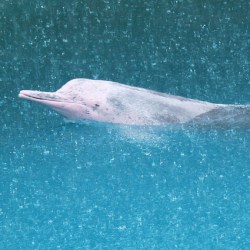Rare Albino Dolphin Spotted Off The Coast Of Florida

According to recent reports, a rare albino dolphin was seen in waters off the coast of Florida. If the reports are to be believed, this would be the first time in nearly fifty years an albino dolphin has been spotted. According to biologists, albinism has been confirmed in 20 species of porpoises, dolphins and whales and there have been only 14 previous sightings of an albino bottlenose dolphin.
The dolphin was spotted last month
Daniel Carter who volunteers with the Florida Fish and Wildlife Conservation Commission shot video footage of the latest sighting last month of the East coast of Florida, in an estuary. An FWC spokesperson said they felt it was worth sharing the video because of how rare the occurrence was, however for the sake of the safety of the animal, they declined to specify its exact location.
Snow white dolphin
Mr. Carter shot a two minute long video showing a bottlenose dolphin that was snow white, surfacing on multiple occasions near a shoreline of mangroves. The best views of the dolphin can be seen towards the end of the video. Albino marine mammals tend to become famous for their fair complexion. One species in particular that is famous for this is the mythological pink river dolphins of Brazil.
Albinism is extremely rare
Albinism is very rare and occurs when recessive genes are passed down from both parents. Whilst most people associate albinism in dolphins with pure white colouring, in actual fact they tend to have a pinkish hue colour, though the very latest sighting appears to be strikingly white. Albinism is also characterised with impaired vision and red eye colouring.
The trait makes animals vulnerable to predation
Because albinism in dolphins is so rare, there has been very little study and researchers are still unsure whether there are any other negative health effects. Greg Bossart, a veterinary pathologist says there is not enough clinical data to suggest whether they are healthy. He adds that it is probably not an adaptive trait because for obvious reasons in the wild, it would make animals more vulnerable to predation.



